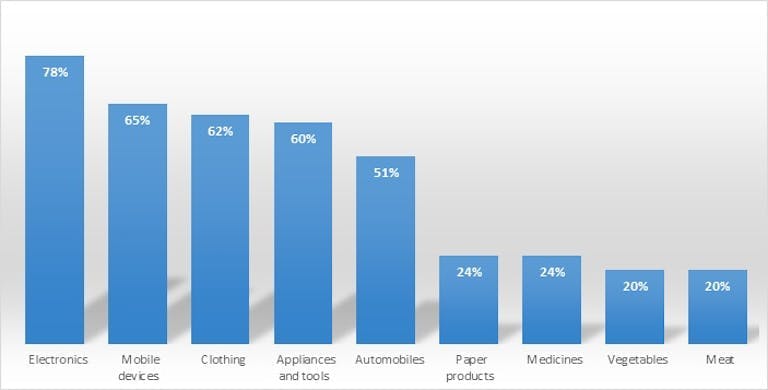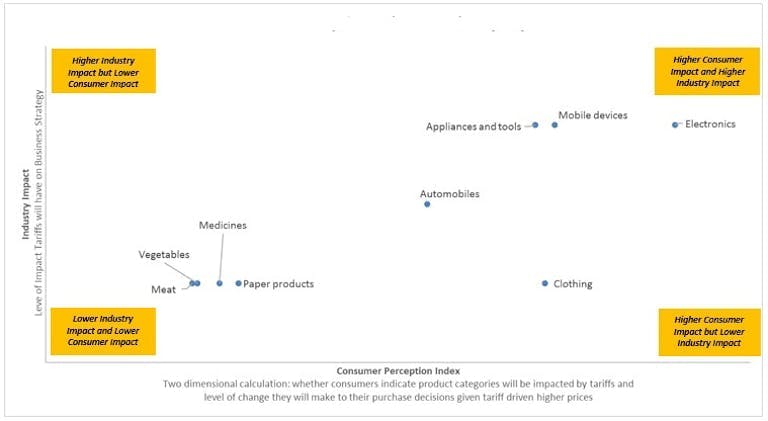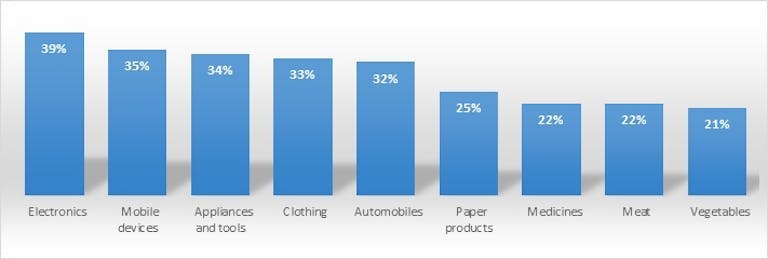Consumers expect the China tariffs to impact them, even if many don’t understand the issues; Disproportionate effect on low-income consumers; potential holiday shopping cutbacks.
Most US consumers (84%) expect the China tariffs will have an impact on them and their families. Through Big Village’s CARAVAN, we spoke with over 1,000 consumers in the US, as well as with trade experts, to gain a more balanced view.
According to the Economist, one study by scholars at the Federal Reserve, Princeton, and Columbia University found that the new levies have raised costs for consumers by $1.4B per month. While consumers expect to feel the brunt of these penalties, only 23% claim to be well informed on the issue. This represents a clear opportunity for companies (as well as politicians) to control the message and inform consumers about the tariffs’ after-effects on their everyday purchases.
Consumers do have distinct perceptions of which products they believe will be effected the most by the tariffs:
Which of the following types of products do you think will be impacted by the tariffs?

Interestingly, despite the relatively low knowledge about the tariffs, consumers and businesses are well aligned on where the biggest impact will be (except for clothing): larger ticket purchases such as appliances, electronics, mobile phones, and to a lesser extent, automobiles.
Consumer Perceptions Index vs. Industry Impact

While consumers are more concerned about clothing, the Industry perspective is not as swayed. This is because (a) it’s generally a lower-priced purchase on individual items (luxury aside) and (b) the industry has moved quickly to diversify away from Chinese manufacturing and will, therefore, be less affected by the tariffs, passing along less of an increase to consumers.
Disproportionate effect on lower-income consumers
Fully 88% of US consumers will consider changes to the products they buy if the prices increase. While average, day-to-day purchases may not see enough of a price increase to significantly impact buying behavior, we expect it will have a disproportionate impact on lower income consumers. CBS News recently shared that The New York Federal Reserve calculates that tariffs already imposed on Chinese imports will cost American families an average of more than $800 a year, which will be felt in the aggregate and will have an impact.
We expect everyone will pay more attention to higher priced goods, where delayed purchasing will likely have an impact. Fortune recently supplied a useful example: tariffs have driven up the cost of washing machines. A study by the University of Chicago’s Becker Friedman Institute of Economics found that consumers are now paying 12% more for washing machines, or the equivalent of $1.5 billion a year. When a $500 washing machine is suddenly $560, at least some consumer will pause on that purchase.
% Who Will Definitely Consider Making Changes if the Price Increase Significantly Due to Tariffs

The impact is likely to be felt most across the U.S. during holiday shopping when consumers will cut back in general and may forgo some of the higher priced purchases for this year.
Companies need to think communication, customer service and innovation
With generally low knowledge of the issues, companies have the chance to inform consumers of why prices are increasing, preparing them on how to cope and own the messaging where needed.
Discretionary spending will become more competitive, so extraordinary customer experience remains the best way to remain relevant and in consumer’s consideration set.
Times like this should spur innovation, as necessity is the mother of invention. Ensure your innovation roadmap considers accelerating access to technology that will initiate radical changes in manufacturing. For example, one of our Experts suggested a pending acceleration of accessible, wide spread 3D printing.
Importantly, ensure that you know where consumers will notice and care about any impact, so your efforts to address it are guided in fact.

